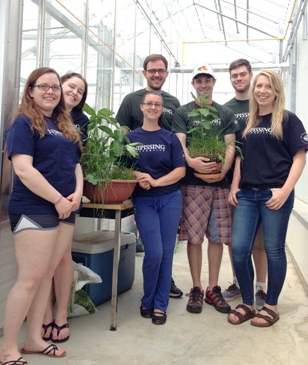NU students helping monarch butterflies

Nipissing University students are doing double duty to make our world a better place, helping to conserve monarch butterflies, while simultaneously transforming a former dump site.
The students, all enrolled in the Flora of Northern Ontario biology course this summer, are working with Nipissing Naturalists and the City of North Bay to raise and plant milkweed to create a habitat for Monarch butterflies at the former dump site on Marsh Drive. Students are sowing milkweed in the university’s greenhouse for planting at dump site.
“We are excited to be partnering with the Naturalists and the City of North Bay on this project,” said Dr. Peter Nosko, a professor in the Department of Biology and Chemistry at Nipissing, and course instructor for Flora of Northern Ontario. “This project is interesting on several levels; from a conservation perspective, we are trying to offset the decline of milkweed and monarch butterflies and from a habitat restoration point of view, we hope to transform an industrial site to an ecologically valuable landscape.”
Monarch butterflies have captured the imagination of people around the world with their epic annual migration from Mexico to northern Canada. Their population has been declining rapidly over the past two decades, in part due to the reduction of milkweed, a critical host plant for the Monarch butterfly.
With the price of grain and oilseeds rising dramatically, field edges and marginal agricultural land are being utilized for crop production, eliminating the Monarch butterfly’s favourite food, the milkweed. Monarch butterflies only lay their eggs on milkweed, and caterpillars eat milkweed exclusively. Most milkweed species are toxic to vertebrate herbivores. When Monarch larvae ingest milkweed, they also ingest the plants' toxins, making the larvae and adult butterflies toxic to potential predators.
As part of their course evaluation, students in the Flora of Northern Ontario participate in a Community Service Learning Project to help develop hands-on skills and experience while providing community partners with a service that they might not have the resources, facilities, or expertise to complete.
Future student activities may also include the establishment of other butterfly-friendly plants at the Marsh Drive site.
